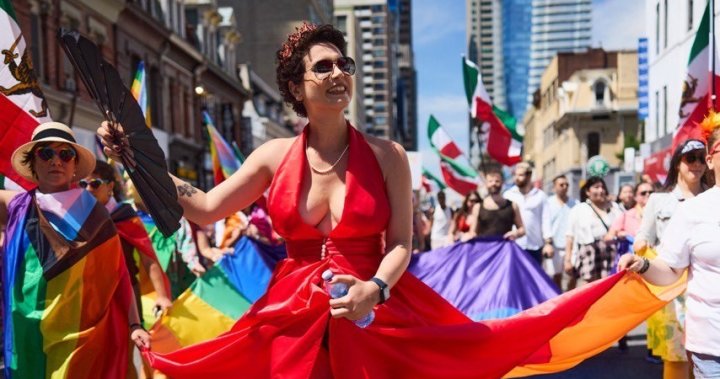Life of an Iranian trans woman
Shaya Goldoust is gearing up for Vancouver’s annual Pride Parade in August.
She is celebrating her pride in being both Iranian and Transgender.
“It’s so important people and the world see we are here, we are living, we are Iranian LGTQ,” she said.
Last month Goldoust took part in Toronto’s Pride Parade, with her native pre-revolutionary flag of Iran and the Pride flag – united.
It was a moment that was once unthinkable for Goldoust.

Behind the cheers and celebrations lies a darker truth.
“I had a lot of problems in Iran as a Trans woman,” said Goldoust.
She described the persecution she faced daily in Iran – violence, harassment, and discrimination.
“You can’t tell the police because it’s your fault – and you’re different.”
Goldoust had gender affirmation surgery in 2012 and feared for her life in Iran.

She left Iran in 2016, escaping to Turkey where she also faced discrimination and torment, she said. Goldoust arrived in Vancouver in 2020, seeking refuge.
“Iran is unsafe, was unsafe for me and people like me,” said Goldoust.
Shaya Goldoust walking in the Toronto Pride Parade.
Shaya Goldoust
In September 2022, two Iranian women – Zahra Sedighi-Hamadani and Elham Choubdar – were sentenced to death by the Islamic Revolution Court of Urumieh.
They were convicted of charges of “corruption on earth” and “trafficking.”
Amnesty International said their sentence was due to their “perceived sexual orientation and gender identity,” and for “defending” 2SLGBTQIA+ rights on social media.
The United Nations demanded Iran immediately halt their executions but Iran said its legal system prohibits homosexuality and same-sex relations.
Homosexuality is a crime punishable by death under the country’s penal code.
In January 2022, Iran executed two gay men who were convicted on charges of sodomy. Human rights groups identified the two men as Mehrdad Karimpour and Farid Mohammadi. They were hanged in the northwestern city of Maragheh.

Persecution of an Iranian gay man
Arsham Parsi is a queer activist who was exiled for love.
“Homosexuality is punishable by death in Iran. The only disagreement between clergies is the method of killing. Some believe they should be stoned to death, some believe they should be thrown out by a cliff or mountain, some believe they have to be hanged, some cut in half by a sword,” Parsi told Global News.
A majority of people are either hanged or stoned to death, he added.
In 2001, Parsi founded an underground organization in Iran to help the marginalized and oppressed 2SLGBTQIA+ community. That made him a target.
“My activities grabbed the attention of the authorities. I found out they are trying to find me. Of course, I used aliens and nicknames but of course they were trying to find out who I am, “ said Parsi.
Parsi is now living in Toronto where he founded the International Railroad for Queer Refugees (IRQR) and the Marjan Foundation, helping the Queer community of the Middle East.

Parsi arrived in Canada on May 11, 2005. He said he has two birthdays – one when he was born in Shiraz, Iran – and the other following his escape from Iran to Turkey and eventually asylum in Canada.
In Iran, he said the police could knock at your door anytime and you could be arrested, simply for your sexuality. As a child when he realized he wasn’t attracted to girls, he was terrified because he knew he could be killed for who he was.
Arsham was not the name he was born with.
“Arsham was a person, an Iranian gay. We met each other at a web design course. We had a lot of plans to do a lot of things for LGBTQ human rights at that time. But unfortunately, his parents found him with his boyfriend and he decided to end his life,” said Parsi.
Parsi said he took his name to continue the dream they both shared.
“I am still continuing my promise to him.”
Arsham Parsi marching in the Toronto Pride Parade.
Arsham Parsi
Helping others
Goldoust is a journalist working in Farsi media and is a producer and host for a Farsi radio program focused on Iran’s queer community.
She has become an inspiration for members of Iran’s 2SLGBTQIA+ community around the world, especially in Iran.
Goldoust takes pride in the photos Iran’s rainbow teens send to her on social media.
“They hold the rainbow flag or Transgender flag in Iran and take a picture and send to me. We are trying for freedom here in Iran too,” said Goldoust
“I think they are so brave, when I was in Iran I couldn’t do it.”
A photo of a rainbow child shared on social media.
Shaya Goldoust
© 2023 Global News, a division of Corus Entertainment Inc.




